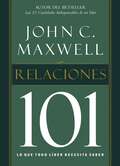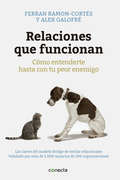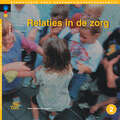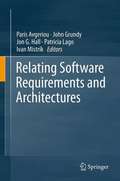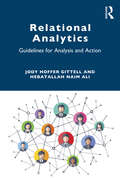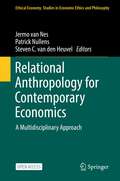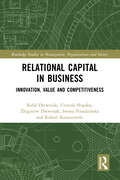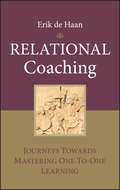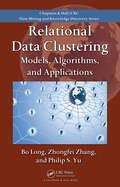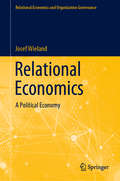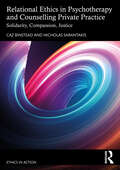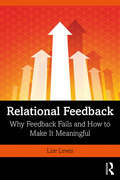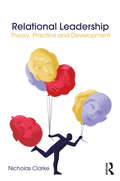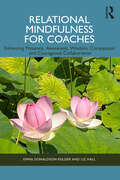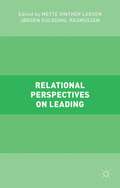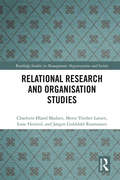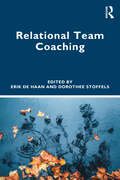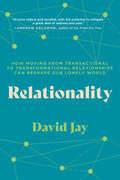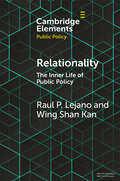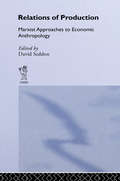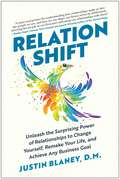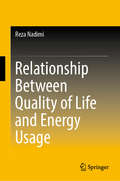- Table View
- List View
Rekrutierung von Fachkräften in China: Wie kleine und mittlere Unternehmen qualifizierte Fachkräfte in China gewinnen
by Ralph Lehmann Marco Städler Ives ZieglerDieses Buch zeigt auf, dass die Gewinnung hochspezialisierter und erfahrener Fachkräfte seit Jahren die zentrale Herausforderung für Personalverantwortliche in China darstellt. Der Mangel an qualifizierten Mitarbeitern ist eines der größten Hindernisse für das gegenwärtige und zukünftige Wirtschaftswachstum Chinas. Auf dieser Problematik aufbauend, gehen die Autoren der Forschungsfrage nach: "Wie gewinnen Unternehmen ihre Schlüsselmitarbeitenden auf dem chinesischen Arbeitsmarkt?“ Anhand einer Literaturanalyse sowie Fallstudien von Schweizer Unternehmen verdeutlichen die Untersuchungsergebnisse, dass vertiefte Marktkenntnisse, eine starke Wettbewerbsposition und die Abstimmung des Rekrutierungsprozesses auf die Bedürfnisse des chinesischen Arbeitsmarktes entscheidende Erfolgsfaktoren sind.
Relaciones 101
by John C. MaxwellTrata sobre cómo conectarse con otros, cómo alentar a los que nos rodean y cómo ser mejores oidores. Relaciones 101 es el instrumento perfecto para quien desee mejorar sus relaciones con los demás.
Relaciones que funcionan: Cómo entenderte hasta con tu peor enemigo
by Alex Galofré Ferran Ramón-CortesUna herramienta para conocer mejor a los demás, ajustar nuestra relación con ellos y, de esta forma, evitar malentendidos y conflictos. Las personas tenemos estilos diferentes, y esto hace que recibamos la comunicación de forma diferente. Adaptar nuestra comunicación al estilo de la persona a la que nos dirigimos hace que nos podamos entender mejor. Para conseguir una relación positiva entre distintos estilos, necesitamos tender puentes de comprensión y aceptación. Necesitamos entender qué necesita cada estilo y qué debemos evitar. Solo así podremos vencer malentendidos y conflictos. Relaciones que funcionan parte de la idea de que cada persona posee un estilo de relación con los otros diferente, y que esos estilos se pueden agrupar en cuatro grandes tipologías. A partir de estas tipologías, los autores proponen una metodología para conocer a nuestros interlocutores y adaptar nuestra comunicación a ellos, de forma que sea más persuasiva. El libro también introduce una reflexión sobre cómo nos podemos relacionar con personas que son aparentemente antagónicas a nosotros, dando explicación a incomprensiones y conflictos a los que a veces nos enfrentamos sin comprender cómo se han originado, y menos aún, cómo resolverlos.
Relaties in de zorg
by H. De JongeBouwstenen voor gezondheidszorgonderwijs is een reeks leerboeken voor de opleidingen tot verpleegkundige, verzorgende en helpende. Deze reeks is volledig afgestemd op de kwalificatiestructuur voor de verpleegkundige en verzorgende beroepen; de samenhang die het opleidingsstelsel kent is in al haar onderdelen terug te vinden in de BGO-reeks.Bovendien is de reeks gebaseerd op een curriculummodel dat vier leer- en vormingsgebieden kent: verpleegkunde/verzorging, mens en gezondheid, gezondheids- problematiek en methoden & technieken. De cirkel op de voorzijde van het boek geeft aan voor welk kwalificatieniveau de uitgave bestemd is. De deelkwalificaties en eindtermen waar de inhoud betrekking op heeft staan in de redactionele verantwoording vermeld.Relaties in de zorg: Dit boek is bestemd voor kwalificatieniveau 2 (helpende) en vormt een onderdeel van het leer-en vormingsgebied mens en gezondheid. In acht hoofdstukken worden alle aspecten van interacties in de zorg behandeld. Het kennisniveau en de toekomstige beroepsuitoefening van de helpende zijn hierbij het uitgangspunt. Naast de algemene elementen van communiceren en samenwerken wordt specifiek ingegaan op kinderen, ouderen en allochtonen. Ook wordt enige elementaire psychologie behandeld. Het boek is rijk aan illustraties, voorbeelden en verwerkingsopdrachten.
Relating Software Requirements and Architectures
by John Grundy Ivan Mistrík Jon G. Hall Patricia Lago Paris AvgeriouWhy have a book about the relation between requirements and software architecture? Understanding the relation between requirements and architecture is important because the requirements, be they explicit or implicit, represent the function, whereas the architecture determines the form. While changes to a set of requirements may impact on the realization of the architecture, choices made for an architectural solution may impact on requirements, e.g., in terms of revising functional or non-functional requirements that cannot actually be met. Although research in both requirements engineering and software architecture is quite active, it is in their combination that understanding is most needed and actively sought. Presenting the current state of the art is the purpose of this book. The editors have divided the contributions into four parts: Part 1 "Theoretical Underpinnings and Reviews" addresses the issue of requirements change management in architectural design through traceability and reasoning. Part 2 "Tools and Techniques" presents approaches, tools, and techniques for bridging the gap between software requirements and architecture. Part 3 "Industrial Case Studies" then reports industrial experiences, while part 4 on "Emerging Issues" details advanced topics such as synthesizing architecture from requirements or the role of middleware in architecting for non-functional requirements. The final chapter is a conclusions chapter identifying key contributions and outstanding areas for future research and improvement of practice. The book is targeted at academic and industrial researchers in requirements engineering or software architecture. Graduate students specializing in these areas as well as advanced professionals in software development will also benefit from the results and experiences presented in this volume.
Relating Software Requirements and Architectures
by John Grundy Ivan Mistrík Jon G. Hall Patricia Lago Paris AvgeriouWhy have a book about the relation between requirements and software architecture? Understanding the relation between requirements and architecture is important because the requirements, be they explicit or implicit, represent the function, whereas the architecture determines the form. While changes to a set of requirements may impact on the realization of the architecture, choices made for an architectural solution may impact on requirements, e.g., in terms of revising functional or non-functional requirements that cannot actually be met.Although research in both requirements engineering and software architecture is quite active, it is in their combination that understanding is most needed and actively sought. Presenting the current state of the art is the purpose of this book. The editors have divided the contributions into four parts: Part 1 “Theoretical Underpinnings and Reviews” addresses the issue of requirements change management in architectural design through traceability and reasoning. Part 2 “Tools and Techniques” presents approaches, tools, and techniques for bridging the gap between software requirements and architecture. Part 3 “Industrial Case Studies” then reports industrial experiences, while part 4 on “Emerging Issues” details advanced topics such as synthesizing architecture from requirements or the role of middleware in architecting for non-functional requirements. The final chapter is a conclusions chapter identifying key contributions and outstanding areas for future research and improvement of practice.The book is targeted at academic and industrial researchers in requirements engineering or software architecture. Graduate students specializing in these areas as well as advanced professionals in software development will also benefit from the results and experiences presented in this volume.
Relating to Peapod
by Jill Avery Susan FournierExplores the relationships formed between consumers and the Peapod consumer-direct grocery delivery service, as revealed through an ethnographic study of Boston-area Peapod shoppers conducted between the Summer of 1997 and the Fall of 1999. Three representative case histories are brought to life using extensive quotes from these selected longitudinal interviews. Closes with short vignettes describing the experiences of four additional service users so that students can offer relationship predictions using process insights derived from the detailed case studies. Together, the data-driven exercises are designed to deepen students' understanding of the development processes characterizing consumer-firm/brand interactions over time, toward the goal of more informed relationship marketing strategies and sharper brand relationship executions.
Relational Analytics: Guidelines for Analysis and Action
by Jody Hoffer Gittell Hebatallah Naim AliThis guidebook goes beyond people analytics to provide a research-based, practice-tested methodology for doing relational analytics, based on the science of relational coordination. We are witnessing a revolution in people analytics, where data are used to identify and leverage human talent to drive performance outcomes. Today’s workplace is interdependent, however, and individuals drive performance through networks that span department, organization and sector boundaries. This book shares the relational coordination framework, with a validated scalable analytic tool that has been used successfully across dozens of countries and industries to understand, measure and influence networks of relationships in and across organizations, and which can be applied at any level in the private and public sectors worldwide. Graduate students and practitioners in human resource management, health policy and management, organizational behavior, engineering and network analysis will appreciate the methodology and hands-on guidance this book provides, with its focus on identifying, analyzing and building networks of productive interdependence. Online resources include data appendices and statistical commands that can be used to conduct all these analyses in readers’ own organizations.
Relational Anthropology for Contemporary Economics: A Multidisciplinary Approach (Ethical Economy #61)
by Steven C. van den Heuvel Patrick Nullens Jermo Van NesThis open access book offers a multidisciplinary dialogue on relational anthropology in contemporary economics. A particular view of the human being is often assumed in economic models, but seldom acknowledged let alone explicated. Addressing this neglected area of research in economic studies, altogether the contributors touch upon the importance and potential of virtues, the notions of freedom and self-love, the potential of simulation models, the dialectics of love, and questions of methodology in constructing a relational anthropology for contemporary economics. The overall result is a highly informative and constructive dialogue, establishing inter alia a research agenda for future collaborative and multidisciplinary study.
Relational Capital in Business: Innovation, Value and Competitiveness (Routledge Studies in Management, Organizations and Society)
by Rafał Drewniak Urszula Słupska Zbigniew Drewniak Iwona Posadzińska Robert KaraszewskiThe concept of relational capital mainly refers to the value of the relationships a company creates with its stakeholders. These relationships inspired the authors to analyze their importance in the context of creating value for the enterprise and to explore the importance of leadership and communication in building relationships with the environment. Internal relational capital refers to the organization’s set of intellectual property, work processes and methods, executive procedures, databases, communication and information infrastructure. Employee relations and leadership activities become pivotal in this context, as improving relational competence and intra-organizational relational capital can foster building lasting relationships with external stakeholders. This book comprises two parts. The first is devoted to discussing the most important concepts and issues related to the essence and importance of relational capital in modern companies, characterizing methods and tools for building relational capital, while pointing to the role of leadership in shaping employee engagement and building intra-organizational relationships. The second part contains the results of empirical research on the importance of relational capital in organizations from the point of view of managers, and the features and scope of maintained relationships with stakeholders. This research allowed for the evaluation of ongoing relationships in terms of how they improved innovation, financial performance, or access to resources. The book will be especially valuable to researchers, academics, professionals and advanced students in the fields of organizational studies, employment relations and leadership.
Relational Coaching
by Erik De Haan Sue StewartManfred Kets de Vries, Professor of Leadership Development, INSEAD: "The author takes us on an exciting journey to explain what coaching is all about, providing us with a roadmap that is second to none. Anyone interested in better understanding what coaching is all about, would do well to have a serious look at this book."David Megginson, Professor of Human Resources Development, Sheffield Hallam University:"From a vivid personal story just before the first chapter to the fascinating mass of data in the appendices, this book is a captivating read about the concrete particulars of coaching and the theoretical perspectives we can use to make sense of them. Erik de Haan makes a case for relational coaching and prescribes clearly what his research and the tradition within which it is embedded can tell practitioners in the field."Bruce E. Wampold, Professor of Counseling Psychology, University of Wisconsin:"I am thrilled that there is a coaching book that emphasizes the coachee and the relationship. In Relational Coaching, Erik de Haan places the emerging profession on a strong foundation that emphasizes the interpersonal aspects of the endeavour."Relational Coaching is a radically different way of looking at coaching that puts the relationship, from the perspective of the coachee, at the centre. Exploring both age-old tradition and reliable studies in recent decades, Relational Coaching gives the modern executive coach ten commandments to help improve his or her practice. The book demonstrates how each of these commandments is underpinned by sound quantitative research.The book begins by giving a complete overview of the profession and the latest developments in coaching. The second part of the book presents new quantitative and qualitative research into effects and experiences of coaching. Part three contains an introduction to the activities that make a good coach and the mechanisms used to verify coaches' understanding of their profession. Other topics covered include training, accreditation, supervision and recommended literature.
Relational Data Clustering: Models, Algorithms, and Applications
by Philip S. Yu Zhongfei Zhang Bo LongA culmination of the authors' years of extensive research on this topic, Relational Data Clustering: Models, Algorithms, and Applications addresses the fundamentals and applications of relational data clustering. It describes theoretic models and algorithms and, through examples, shows how to apply these models and algorithms to solve real-world problems.After defining the field, the book introduces different types of model formulations for relational data clustering, presents various algorithms for the corresponding models, and demonstrates applications of the models and algorithms through extensive experimental results. The authors cover six topics of relational data clustering:Clustering on bi-type heterogeneous relational dataMulti-type heterogeneous relational data Homogeneous relational data clusteringClustering on the most general case of relational dataIndividual relational clustering frameworkRecent research on evolutionary clusteringThis book focuses on both practical algorithm derivation and theoretical framework construction for relational data clustering. It provides a complete, self-contained introduction to advances in the field.
Relational Economics: A Political Economy (Relational Economics and Organization Governance)
by Josef WielandThis book introduces the research agenda of relational economics as a political economy for the governance of local and global economic transactions in modern societies. It analyses the mechanisms of global value creation and production networks by studying cooperation in intra- and inter-firm networks, intersectoral stakeholder management, and transcultural leadership. The author develops a categorical taxonomy for private and public value creation based on the effective and efficient interlinking of, and interaction between, a range of resources and abilities. In contrast to mainstream economics, which largely focuses on the laws of discrete and dyadic exchange transactions, this book assesses the polyvalent characteristics of relational transactions. The chief categories involved in an economic theory of the relations between events are the relational transactions and their various forms of governance; the polycontextual cooperation between economic, political and civil society agents; and the factor incomes and relational rents that relational transactions produce. Today, relational transactions are the rule, not the exception, in modern economies and their global value creation networks. Given its scope and focus, this book will appeal to scholars of economics, economic sociology, organisational studies and related fields.
Relational Ethics in Psychotherapy and Counselling Private Practice: Solidarity, Compassion, Justice (Ethics In Action)
by Caz Binstead Nicholas SarantakisThis book explores the ethics around everything connected with setting up and running a therapy private practice.Offering a hands-on approach to realistic ethical dilemmas encountered by the private practitioner, the book examines the everyday management of practice, and the context of ethical issues in contemporary private practice. Chapters explore the fundamentals of some of the most common ethical considerations in private practice, providing space for the reader to think creatively about how they use their preferred ethical framework, and how that may be translated into an individually tailored approach for each client, and for each private practice. The book provides exercises, examples, and vignettes, in addition to the author’s own unique working model, to help the reader bring theoretical reflections into their own everyday practice.Relational Ethics in Psychotherapy and Counselling Private Practice will help private practitioners feel more confident and grounded in their private practice and up-to-date with developing thoughts. It will also appeal to training institutes, supervisors, and students.
Relational Feedback: Why Feedback Fails and How to Make It Meaningful
by Lise LewisPeople are increasingly disenchanted with performance improvement techniques that fail to deliver. This book offers a new and refreshing way of engaging in authentic feedback that is willingly given and well-received. It demonstrates that focusing on the quality of relationship improves the activity of feedback. The Relational Leadership WAY© that is the core of this book was created from a thematic analysis of a doctoral research study. The framework encourages effective relationships and works through perfecting a ‘way of being’ that is generative and productive in interactions with others; especially in feedback conversations, whether we are the giver or the receiver. The 10 themes integral to the framework are organised into 3 parts that relate to pivotal points in a conversation and that when given focused attention will improve relationships: What needs preparing to establish relationships that stimulate constructive conversations Active engagement in co-creating generative conversations through adopting relational behaviours You both noticing and reacting to what emerges and impacts on sustaining the quality of the relationship. This book will appeal to those seeking an innovative approach to performance management and who welcome a reprieve from the relentless pursuit of a universal feedback tool. It is essential reading for: Business managers and leaders expected to motivate teams to become high performing work units Organisational and independent coaches, mentors and practice supervisors developing trust by building effective relationships that encourage disclosure through engaging and authentic feedback Managers, leaders, HR and OD specialists to use as a business text for performance management programmes Training organisations to use as a core text for delegates.
Relational Leadership: Theory, Practice and Development
by Nicholas ClarkeThe traditional idea of leadership as being about the solo, heroic leader has now run its course. A new way of thinking about leadership is now needed to address major challenges such as achieving greater social responsibility, enhancing leadership capacity and recognising the importance of context as affecting how leadership occurs. Relational leadership offers a new perspective of leadership that addresses these challenges. At its core, relational leadership recognises leadership as centred in the relationships that form between both formal and informal leaders and those that follow them, far more so than the personality or behaviours of individual leaders. This book introduces readers to the most up-to-date research in this area and the differing theoretical perspectives that can help us better understand leadership as a relational phenomenon. Important characteristics of effective leadership relationships such as trust, respect and mutuality are discussed, focusing on how they develop and how they bring about leadership effects. Specific forms of relational leadership such as shared leadership, responsible leadership, global team leadership and complexity leadership are addressed in subsequent chapters. The book is the first to examine recent ideas about how these new forms of relational leadership are put into practice as well as techniques, tools and strategies available to organisations to help do so. The inclusion of three detailed case studies is specifically designed to help readers understand many of the key concepts covered in the book, with key learning points emphasised. The book offers an excellent summary of the state-of-the-art topics in this new and exciting field of relational leadership.
Relational Mindfulness for Coaches: Enhancing Presence, Awareness, Wisdom, Compassion and Courageous Collaboration
by Liz Hall Emma Donaldson-FeilderThe quality of coaches’ presence and awareness is key to the quality and success of their coaching relationships and interventions. Relational Mindfulness for Coaches supports coaches to co-create compassionate, psychologically safe yet courageous coaching spaces, generating profound insight, wisdom, and understanding in the client.At the book’s heart are powerful practices to expand mindful presence from the individual to the relational, bringing present-moment, non-judgemental awareness to self, others, and the relationship, whilst speaking and listening. The book provides understanding of Relational Mindfulness’s (RM’s) foundations in mindfulness, compassion, and Insight Dialogue. Drawing on their and other experienced coaches’ experiences, the authors illustrate the benefits of engaging in RM practices and provide easy-to-follow guidance for bringing RM into coaching. They also situate RM in the wider field of theory and practice, including neuroscience, and explore RM in relation to a host of other coaching models. In these challenging times of polarisation and conflict, the climate emergency, and a crisis in mental health, this inspiring book addresses the urgent need to create transformational dialogue and interrelatedness in coaching and beyond.This pioneering book will be essential reading for coaches, coaching supervisors, coaching psychologists, coaching academics, leaders, and other helping professionals.
Relational Perspectives on Leading
by Mette Vinther Larsen Jørgen Gulddahl RasmussenRelational Perspectives on Leading discusses leadership from a relational and social constructionism perspective as practiced on an everyday basis between people. The book pursues a fast growing, practice-based approach - particularly within the Anglo-Saxon parts of the world - to organization studies and organizational phenomena. This approach allows more micro-oriented and incremental aspects of organizational practices to be explored. Key concepts explored within this perspective revolve around plurality, emergence, interpretation, communication, meaning, linguistic turn, practice, coincidence, in-situ, co-construction and the ability to construct new ways to move forward in relation with other. The authors analyse these concepts by integrating theory and practice in concrete organizational examples.
Relational Research and Organisation Studies (Routledge Studies in Management, Organizations and Society)
by Lone Hersted Charlotte Øland Madsen Mette Vinther Larsen Jørgen Gulddahl RasmussenThis volume lays out a variety of ways of engaging in research projects focused on exploring the everyday relational practices of organizing and leading is presented. The main focus is through elaborate examples from the author’s own research to further the understanding of how it is possible to carry out relational constructionist research inquiries. The book presents a series of examples ranging from conversations with top-managers, relational action learning processes in management groups, polyphonic inquiries for project management teams, transformative roleplaying in organizations, analyzing organizational dialoguing, and polyphonic future-forming ways of writing up research. Relational Research and Organisation Studies does not only present and discuss guidelines for practice at a onto-epistemological level but also presents and discusses concrete cases of research projects building on relational constructionist ideas. Furthermore, excerpts of data are presented and analyzed in order to explain the co-constructed processes of the inquiries more in detail. Relational Research and Organisation Studies invites the reader into the process of planning and carrying out relational constructionist research inquiries. Based on the authors own experiences, it inspires readers to develop their own relational inquiries within the field of organizing.
Relational Team Coaching
by Erik De Haan Dorothee StoffelsRelational Team Coaching is a state-of-the-art reference book detailing what makes team coaching effective, with a focus on being able to work at a relational level within the here and now, about what is going on in the present in the team and between the team and the coach. The scope of the book is comprehensive, exploring challenging and topical issues. Part A presents an introduction to team coaching and to a relational, integrative approach to team coaching, providing access to all relevant background, research and case studies of team coaching in action. Part B deepens how this relational philosophy looks in practice and what it means for choices and working methodology of the team coach. Part C, finally, explores how the team coach can step up to face or address the more challenging or professional aspects of practice (e.g., of contracting, diversity and inclusion, and the shadow side of boards). This book is an essential guide to relational-based effectiveness in team coaching. It will be a key text for all coaching practitioners, including those in training.
Relationality: How Moving from Transactional to Transformational Relationships Can Reshape Our Lonely World
by David JayFor readers of Together and The Art of GatheringHow moving from transactional to transformational relationships and organizations can save our democracy, nurture our connections, and make us happier and healthier.Powerful institutions, from schools to tech and social media companies, create breeding grounds for isolation by failing to invest in relational work. This obstacle stands in the way of our fight for racial equity, economic justice, and climate resilience.In Relationality, leading asexuality and relationship activist David Jay brings clarity to the crisis with a fresh perspective that expands upon the fundamental idea that all entities in the universe are connected. Jay draws from a range of vivid personal experiences, including his time spent helping tech workers and policymakers reform social media.This book is for people who believe in the power of relationships and want to see increased investment in relational work. Its scientifically grounded framework will help readers foster conversations about relational work, establish conditions for relationships to thrive, and quantify the impact of them.Equipping professionals and activists involved in nonprofit, political, and other types of relational work with the knowledge they need to fight for and utilize resources, Relationality shares valuable insight on: The history of why institutions fail to invest in relationships Reimagining ROI calculations to account for relational workUsing tools of prediction and emergence theory to build communitiesHow stories and data about relationships can help us direct resources toward relational workRelational economics and the redistribution of wealthWith isolation and loneliness on the rise in a post-lockdown world, Relationality offers a roadmap to nourish our connections toward a better, more liberated world—personally, organizationally, and in community.
Relationality: The Inner Life of Public Policy (Elements in Public Policy)
by Raul P. Lejano Wing Shan KanThis Element argues that relational policy analysis can provide deeper insights into the career of any policy and the dynamics of any policy situation. This task is all the more difficult as the relational often operates unseen in the backstages of a policy arena. Another issue is the potentially unbounded scope of a relational analysis. But these challenges should not dissuade policy scholars from beginning to address the theme of relationality in public policy. This Element sketches a conceptual framework for the study of relationality and illustrates some of the promise of relational analysis using an extended case study. This title is also available as Open Access on Cambridge Core.
Relations of Production: Marxist Approaches To Economic Anthropology
by David Seddon Helen LacknerFirst Published in 1978. Routledge is an imprint of Taylor & Francis, an informa company.
Relationshift: Unleash the Surprising Power of Relationships to Change Yourself, Remake Your Life, and Achieve Any Business Goal
by Justin BlaneyLearn to leverage your relationships so you can dream bigger, achieve whatever you want, and build a life that makes you happier with each passing day. No greater force for change exists than the people we surround ourselves with. Relationshift explores how the people in your life have colored your worldview, how this limits or expands your options, and what to do about it. Through the stories of British explorer Gertrude Bell, abolitionist hero Frederick Douglass, music icons the Beastie Boys, and many others, this book will help you: Learn how to connect with high-caliber people who can help you go further in life. Understand the rules of life as handed down through countless generations—then learn how to recognize which ones can be bent. Grow in happiness, thankfulness, peace, and contentment while eliminating the power of negative emotions. Explore how our minds reject new concepts like our bodies reject viruses. Build a personal tribe that can help you achieve any goal in work, health, or relationships. Make better choices by learning to see your options more clearly and honing your ability to move quickly with less information. Identify relationships that have the most impact on your wellbeing, for better or worse. Discover and refine the direction of your life by exploring wisdom from twenty experts on purpose. With dozens of illustrations and practical examples, Relationshift will help you take greater control of your life and uncover a path to your best possible future.
Relationship Between Quality of Life and Energy Usage
by Reza NadimiThis book utilizes statistical techniques to define a quality of life (QoL) indicator combining the three dimensions of economy, health, and education. In turn, it uses modeling to assess the impact of energy consumption on 112 countries’ QoL. What sets the proposed model apart from previous research is its ability to distinguish between pre-developing, developing, and developed countries. One important aspect of this distinction is their different global energy policies and their priorities with regard to achieving sustainable energy consumption. Accordingly, the book also discusses eco-sufficiency, eco-efficiency, and energy poverty reduction for the three different types of countries. In turn, the book provides general information on how to reconcile sustainable energy consumption with QoL and economic development. Optimization programming technique and simulation are applied to measure potential energy saving in each country, without sacrificing economic progress, and while maintaining QoL. Given its scope, the book is highly recommended to the following audiences: (1) readers seeking a state-of-the-art quantitative work on energy systems and QoL; (2) manufacturers and developers of renewable energy technologies who consider renewables as an option for mitigating energy poverty; and (3) international institutions such as the United Nations seeking a sustainable global energy strategy.

